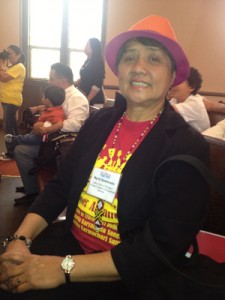On September 17, Secretary of Labor Tom Perez released regulations that will change minimum wage and overtime regulations to cover nearly two million home care and other direct care workers. This workforce is 90 percent women, and approximately half people of color. For decades these workers have been categorized as “companions,” on which basis they were excluded from protections. As a result of the changed regulations, working women like Myrla will have a path out of poverty.
A few days later, on September 26, California Governor Jerry Brown signed the California Domestic Workers Bill of Rights into law, extending overtime protections to thousands of domestic workers in the state. For women like Thelma Reta, who works as a live-in caregiver for frail elders in California and earns $35 per day, this means a whole new way of life.
By extending basic labor protections to in-home care workers, the Department of Labor has begun to pave the way for the strong care workforce we know we will need for the 21st century. Every eight seconds someone in America turns 65. By 2020, we will need at least 5 million direct care workers to meet the growing demand for care — nearly doubling the workforce in the next seven years.
And in California, home to the largest concentration of private caregivers in the country, the new state law ensures them equal coverage under the law. This represents an historic and long overdue step forward, toward inclusion, equity and opportunity for this vital workforce.
The Department of Labor change is set to come into effect in 2015 and the California bill goes into effect on January 1, 2014. Both at the federal level and locally there is still work to do so that the new rules are implemented and enforced fairly and effectively. Ensuring fair implementation includes protecting Medicaid and other vital programs that support in-home services in federal and state budgets.
These victories are just the beginning of what’s needed to meet the nation’s rapidly growing direct care needs. We must continue to improve the quality of caregiving jobs, while increasing consumers’ access to quality services and support they need — at a price they can afford. The tremendous progress of September 2013 should serve as a call to action to members of Congress: they must develop the bold public policy we need, to continue to improve care jobs and expand access to quality care for all.



